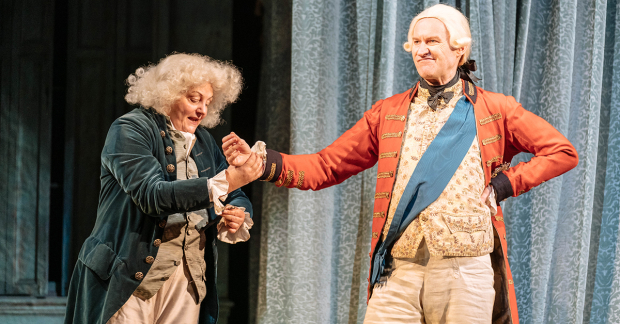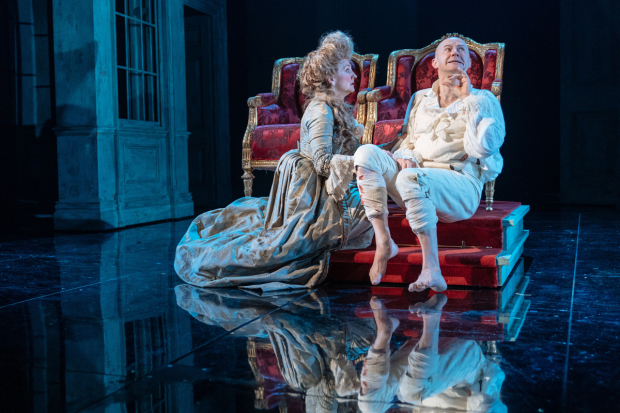Review: The Madness of George III (Nottingham Playhouse)

© Nottingham Playhouse
Aside from recent wedding fever there is a torrent of film and TV drama the Royal Family spawn, provoking inexplicable worldwide obsession. From The Crown to The Queen, to The King's Speech, they are dramatic dynamite; such a delicious irony is at work when the divine and godlike display imperfections. It's as if we couldn't possibly believe that they are human beings like everyone else.
This Adam Penford directed Alan Bennett play looks a clever choice, especially with added celebrity firepower in the form of Mark Gatiss, Adrian Scarborough and Debra Gillett.
It turns into a fascinating, intelligent exploration of power and its explicit or subtle shifting, as fortunes and faculties between Kings and Queens, doctors and politicians fluctuate.
The first ten minutes are a little underwhelming and with the bombastic, regal backdrop and ultra slick costumes there is an air of Restoration comedy fluff about it. Gatiss soon puts paid to that, however, as we witness George's creepy unravelling.
Three doctors scrabble about trying to help in different ways, parliament hits boiling point and the Princes set about usurping their father. It looks like period comedy but actually feels like profound drama. If it can even be called comedy, then it is a very serious one. Bennett structures the piece to encompass these wranglings of position whilst taking George on not just an arc, but a complete circle.
And Gatiss navigates this circle so skilfully it is mesmerising to watch. The timing of his descent in the first half is judged to perfection, the 'madness' enveloping him in alarming fashion. What's then gripping is how those around him act on it. The decisions Gatiss makes, the physicality of the performance, his tics and convulsions display craftsmanship of the highest order. His maladies are occasionally framed in conjunction with dialogue spoken by other characters and so detailed and compelling is his performance here you might miss what is being said because it's simply impossible to stop watching what he is doing.
Bennett raises questions. When does a King, Queen or PM disinherit their power and where is that decided? Is a King not fit to rule if he is mad, ill or imperfect? Was George actually mad at all? Who benefits and who makes the decisions? Where do the doctors get their power from? Will loyalty get you further than political scheming?
Scenes are short and snappy and the revolving, alternating sets by Robert Jones are clever to reflect the changing positioning of the players. There is a memorable, tense ending to the first half, complemented by Richard Howell's lighting flourishes and Tom Gibbons' sound.
Every actor works well to define. Stephanie Jacob's brilliant timing and delivery as Dr Baker ('Has he been bled?') added touches of comedy to a piece that is not always so laugh out loud funny.
A particularly moving scene in which the King and Queen are forced to be kept separate from each other has a grim resonance encapsulating the transience of power. In a time when awareness of mental illness is perhaps more acute than ever, this play asks where on earth the line ends for us. When does the state of the mind lead us to relinquish the power we all have in our worlds, families, our lives.
















